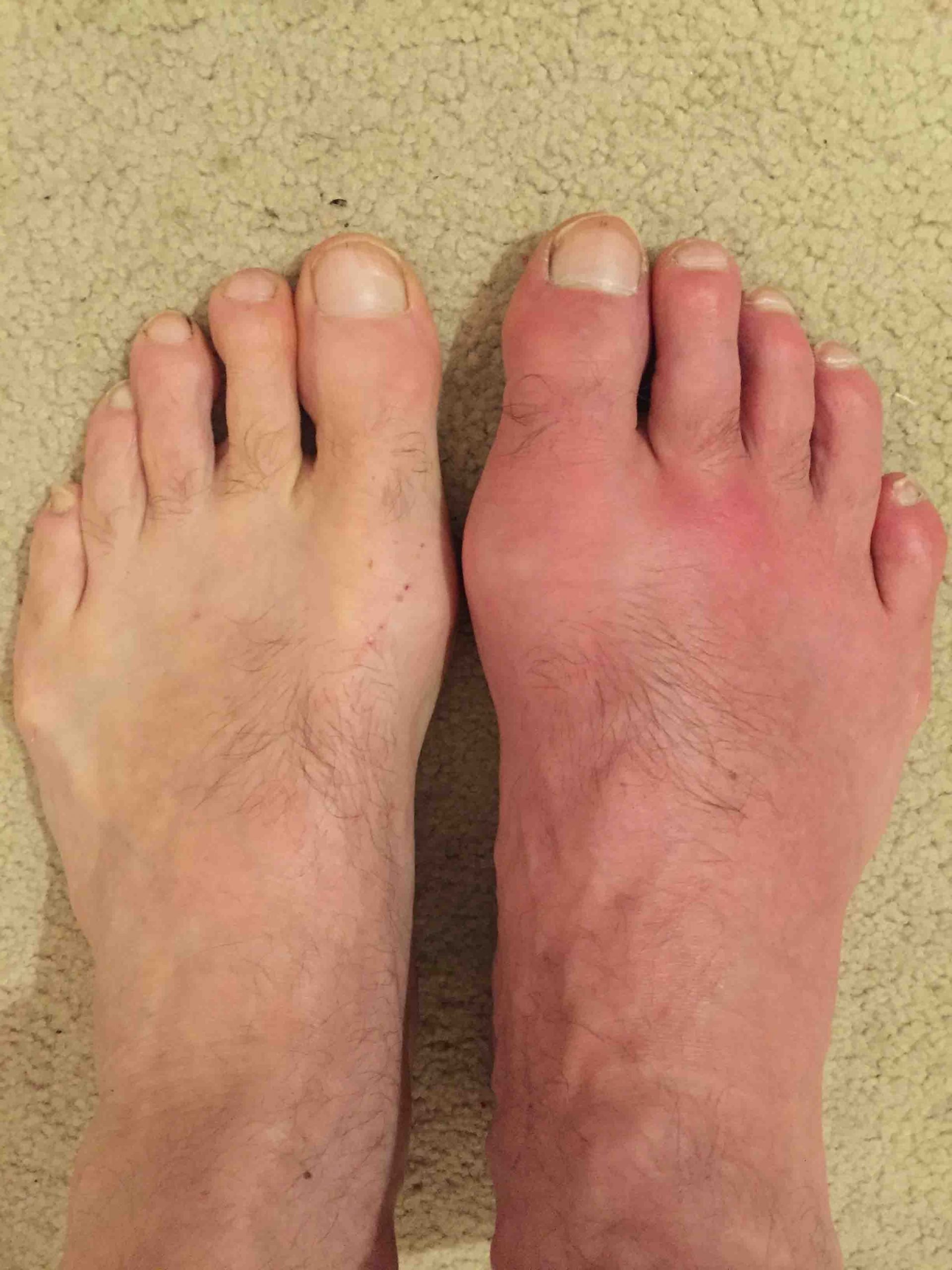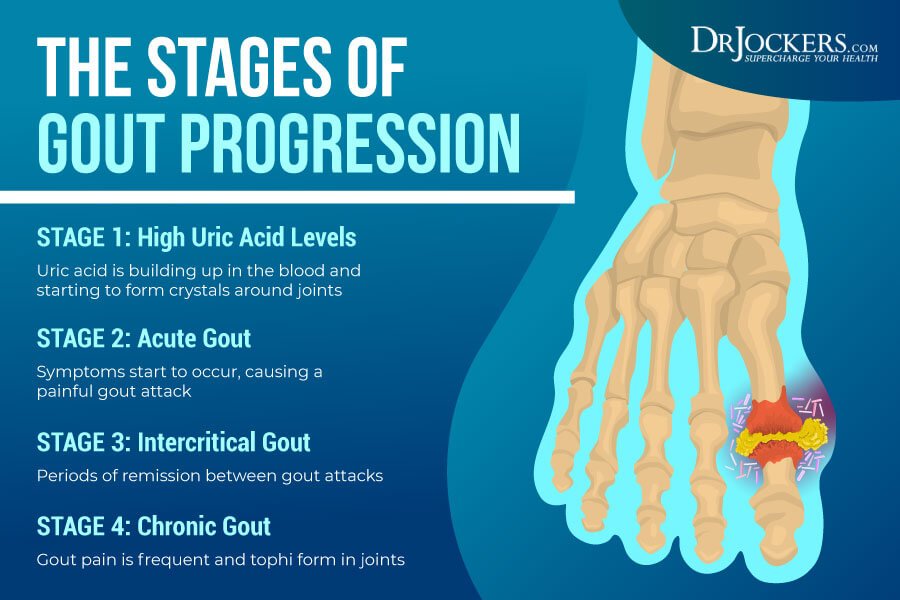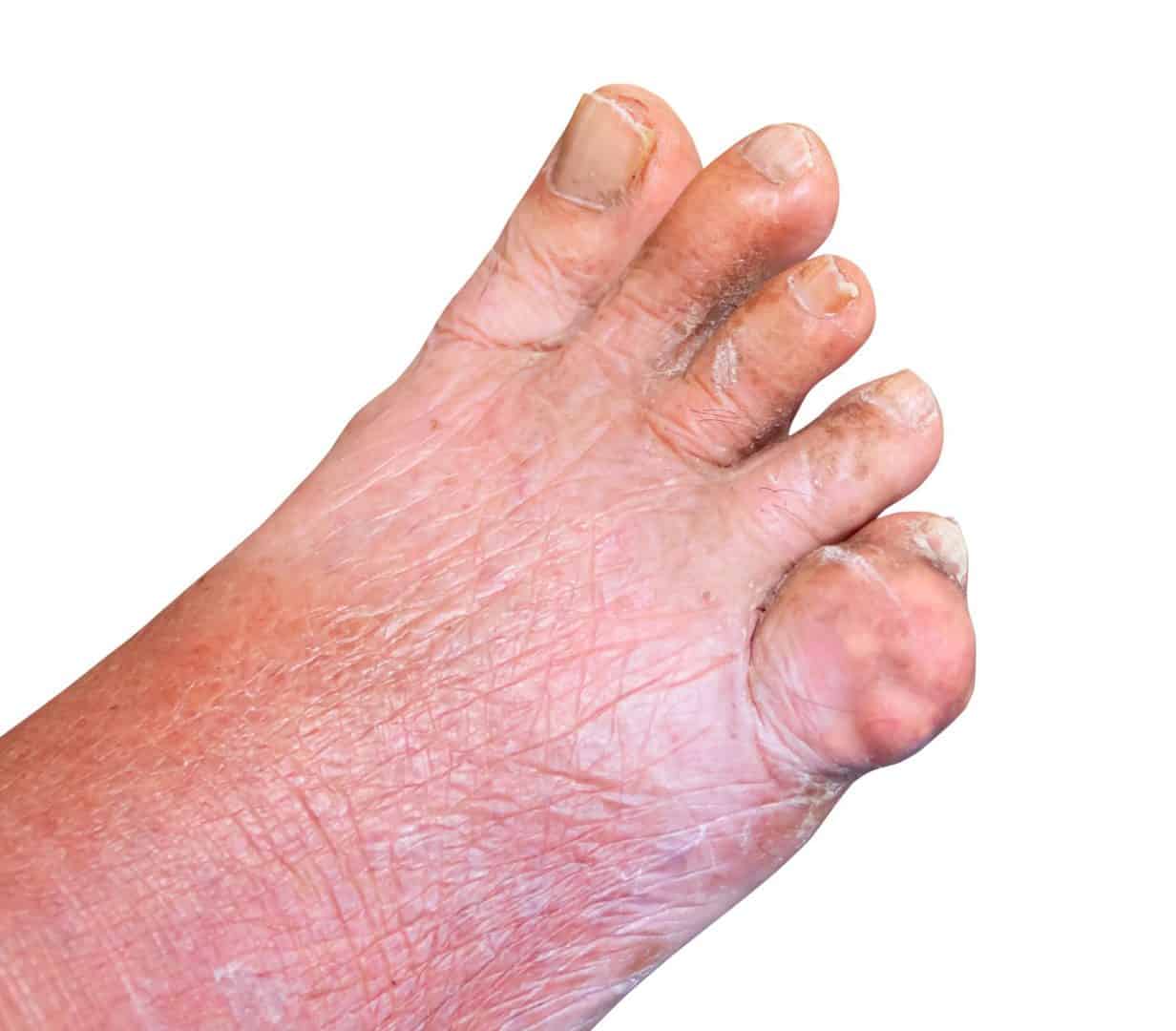The Role Of Physical Activity In Prevention Of Gout
Along with diet, physical activity can help with weight loss, and gout has been associated with being overweight.7 in patients with well-established gout, especially if X-rays have demonstrated joint damage in the foot, a low-impact exercise program is reasonable. An exercise program combined with diet in gout can reduce risk for attacks.7 If an attack seems to be coming on in the lower extremity, patients are well-advised to try to get off their feet, since impact seems to worsen gout attacks. Clues to an attack of gout coming on include local swelling, heat, redness, and tenderness in a joint, especially in the foot, ankle, or knee. Some patients have fever and chills as the first warning that an attack of gout is coming on.
Medications For Acute Gout
What Is Gout Know The Signs And Risk Factors
4 Minute Read
Medically Reviewed by UPMC Orthopaedic Care
Gout is a potentially debilitating form of inflammatory arthritis that causes pain, redness, stiffness, and swelling in your joints. More than 8 million people in the United States have gout.
The condition usually affects one joint at a time. About half of all gout attacks begin in the big toe, but it also can occur in the ankles, heels, knees, wrists, fingers, and elbows.
Although gout can cause pain, it can be managed with proper treatment.
Don’t Miss: Almonds Good For Gout
Natural Course Of Disease
Charcot foot is characterized by four different disease stages , resembling active and inactive disease phases: inflammation, fragmentation, coalescence, consolidation. The disease is normally limited to a single-run through these different disease stages. The active phase is characterized by a hot, red, and swollen foot , often without pain, due to the polyneuropathy . In the active phase, the bone gets fragile due to temporary osteopenia leading to fractures, joint destructions and collapse of the longitudinal arch of the foot . During the less active or inactive phase, the foot is not red any more, but some soft tissue and bone marrow edema may last. Prominent osteophytes and palpable loose bodies are the consequence of a substantial joint and bone destruction followed by bony proliferations . The typical end-stage appearance of a Charcot foot is the so-called rocker-bottom deformity .
Rocker-bottom deformity: end-stage of Charcot foot. a Clinical image. b Corresponding lateral radiograph
A recent study showed that there is a risk of re-activation of a formerly in-active Charcot foot in about 23% within a mean interval of 27 months .
What Are The Symptoms Of Gout

An episode of gout is called a gout attack. Gout attacks are very painful and can happen quite suddenly, often overnight. During a gout attack, symptoms in the affected joint may include:
- Intense pain.
- Tenderness, even to light touch, such as from a bedsheet.
- Warmth, or a feeling like the joint is on fire.
- How long does a gout attack last?
A gout attack can last a week or two. Between gout attacks, you may have no symptoms at all.
Recommended Reading: Is Onion Bad For Gout
Am I At Risk Of Having Gout
Youre more likely to have a gout attack if you:
- are male
- have a family history of gout
- have elevated levels of uric acid in the blood
- drink too much alcohol
- eat a diet high in purines such as meat, sweetbreads, offal, shellfish, and fructose
- are overweight or obese
- use diuretics
- have type 2 diabetes, high blood pressure or high cholesterol these conditions can mean that your kidneys are less able to flush out the urates
- have kidney disease
Who Develops Hallux Rigidus
People who participate in sports where loading, stressing, and extending movements are required of their feet become susceptible to micro-trauma and sprains in the joint at the base of the big toe. “Turf toe,” the name given to these injuries, can also cause bone spurs or osteophytes to develop. Soccer and football played on artificial turf cause most toe injuries in sports. If not treated properly, turf toe can lead to hallux rigidus.
Not only athletes develop hallux rigidus though. People who have fallen arches or excessive pronation of the ankles are susceptible to developing hallux rigidus. It can run in families as certain foot types are more prone to developing hallux rigidus than others. Hallux rigidus may also be caused by specific inflammatory diseases, such as rheumatoid arthritis or gout.
Read Also: Are Almonds Good For Gout
Diagnosis Treatment And Prevention Of Gout
BARRY L. HAINER, MD ERIC MATHESON, MD and R. TRAVIS WILKES, MD, Medical University of South Carolina, Charleston, South Carolina
Am Fam Physician. 2014 Dec 15 90:831-836.
Gout is the most common inflammatory arthropathy, affecting more than 8 million Americans.1 Gout accounts for approximately 7 million ambulatory visits in the United States annually at a cost of nearly $1 billion.2 Risk factors include genetics, age, sex, and diet.2,3 These factors may contribute to a high serum uric acid level, which is currently defined as a value of at least 6.8 mg per dL .4,5
SORT: KEY RECOMMENDATIONS FOR PRACTICE
Oral corticosteroids and nonsteroidal anti-inflammatory drugs are equally effective in the treatment of acute gout.
| Clinical recommendation | ||
|---|---|---|
|
To prevent recurrent gout, patients should reduce their consumption of high-fructose corn syrupsweetened soft drinks, fruit juices, and fructose-rich vegetables and fruits . Reducing consumption of meat and seafood, and increasing consumption of dairy products help reduce the frequency of gouty symptoms. Consumption of low-fat or nonfat dairy products may help reduce the frequency of flares. |
A = consistent, good-quality patient-oriented evidence B = inconsistent or limited-quality patient-oriented evidence C = consensus, disease-oriented evidence, usual practice, expert opinion, or case series. For information about the SORT evidence rating system, go to .
Consult A Physical Therapist
Physical therapy absolutely comes into play when trying to manage arthritis foot pain and there are all kinds of PT modalities that can be used to decrease inflammation, including massage, whirlpool, cold packs, ultrasound, and lasers, Dr. Spielfogel says. Once the initial inflammation has been reduced, a physical therapist will develop a program of stretching and strengthening to restore flexibility and improve strength to increase balance and reduce stress on the foot joints.
Dr. Sutera finds that patients in the earlier stages of arthritis benefit the most from physical therapy, as they often still have flexibility and mostly need help restoring their balance.
Don’t Miss: Side Effects Of Allopurinol And Alcohol
How Do You Treat A Staph Infection On Your Toe
- As mentioned above, the best way to treat staph infection on her toes is to get as healthy as possible, see a podiatrist as early as you can and get as healthy as possible.
- If you need a podiatrist, you can give us a call in Michigan, and we can try to help. Otherwise, see the podiatrist closest to you or your primary care doctor soon as possible.
- It is not a good idea to try and treat staph infection on your toe, foot, or heel by yourself at home.
How To Diagnose Neuropathic Arthopathy
Early diagnosis is of utmost importance for successful treatment of Charcot foot. To properly diagnose Charcot foot, thorough examination of the foot and ankle by the surgeon, as well as answers to a series of questions to determine what events may have led to its present condition, are required.
X-rays are an essential tool for proper diagnosis of Charcot foot. Other imaging studies and lab tests may be ordered by the surgeon. During treatment procedure, X-rays are taken regularly to help evaluate the status of treatment.
Read Also: Allopurinol Side Effects Alcohol
Who Is At Risk Of Gout
Gout is sometimes called the disease of kings because of a false link to overindulgence in food and alcohol. Anyone can get the condition, but certain factors can increase your risk:
- Gender: Males are more likely to get gout than females.
- Age: Middle-aged and older men and women after menopause are more at risk for gout.
- Obesity
- Family history
- Diet: A diet high in purines, which are broken down into uric acid, can lead to gout. High purine foods include meats like bacon, turkey, veal, venison, and liver, and seafood like anchovies, sardines, mussels, codfish, scallops, trout, and haddock. High fructose foods and drinks such as soda pop also can increase your risk.
- Alcohol use
Treatment For Gout In The Heel

There is no cure for gout, but treatment to limit attacks and control painful symptoms are available.
If your doctor diagnoses gout, they will most likely suggest medication and certain lifestyle changes based on findings in the testing and your current health.
Certain medications treat gout attacks or flare-ups. Others reduce the risk of potential gout complications.
Read Also: Are Oranges Good For Gout
Decreased Excretion Of Uric Acid
Two thirds of urate excretion occurs in the kidneys while the rest is excreted through the gastrointestinal tract . Reduced secretory function of the transporter ABCG2 leads to decreased excretion of uric acid through the GIT resulting in rise of serum levels of uric acid and enhanced renal excretion .
How Can An Attack Of Gout Be Treated
The management of an acute attack of gout is very different from the prevention of subsequent attacks.
Treatments used for prevention, such as allopurinol can actually make things worse if given during an attack, and so need to be held back until the attack has resolved for several weeks.
There are a number of measures that can help resolve an attack of gout. See Table 2 for summary of treatment strategies for acute gout. One principle is that treatment for an attack of gout should be instituted quickly, since quick treatment can often be rewarded with a quick improvement.
If an attack of gout is allowed to last more than a day or so before treatment is started, the response to treatment may be much slower.
Table 2: Medications to treat acute attacks of gout
Read Also: Is Tofu Good For Gout
How Are Gout Attacks Prevented
Maintaining adequate fluid intake helps prevent acute gout attacks and decreases the risk of kidney stone formation in people with gout. Alcohol is known to have diuretic effects that can contribute to dehydration and precipitate acute gout attacks. Alcohol can also affect uric acid metabolism and cause hyperuricemia. It causes gout by slowing down the excretion of uric acid from the kidneys as well as by causing dehydration, which precipitates the crystals in the joints.
When Is Surgery Considered For Gout
The question of surgery for gout most commonly comes up when a patient has a large clump of urate crystals , which is causing problems. This may be if the tophus is on the bottom of the foot, and the person has difficulty walking on it, or on the side of the foot making it hard to wear shoes. An especially difficult problem is when the urate crystals inside the tophus break out to the skin surface. This then can allow bacteria a point of entry, which can lead to infection, which could even track back to the bone. Whenever possible, however, we try to avoid surgery to remove tophi. The problem is that the crystals are often extensive, and track back to the bone, so there is not a good healing surface once the tophus is removed. In some rare cases, such as when a tophus is infected or when its location is causing major disability, surgical removal may be considered.
Since it is hard to heal the skin after a tophus is removed, a skin graft may be needed. For this reason, we often try hard to manage the tophus medically. If we give high doses of medication to lower the urate level, such as allopurinol, over time the tophus will gradually reabsorb. In severe cases, we may consider using the intravenous medication pegloticase , since it lowers the urate level the most dramatically, and can lead to the fastest shrinkage of the tophus.
Read Also: Almonds And Gout
Differences Between Men And Women
Sex differences play a role in which joints are affected:
- In men, about 85% of gout flare-ups affect joints in the lower extremities. About 50% of first-time gout attacks involve a big toe joint.8
- In women, a gout attack is most likely to occur in a knee.10 In addition, women may be more likely to get gout in the upper extremities.9
While women are less likely to get gout, they are more likely to have multiple joints affected by gout.13
What Can Increase Your Risk
A high level of uric acid in the blood is the main factor that increases your risk of developing gout. However, it’s still uncertain why some people with a high level of uric acid in the blood develop gout, while others with an equally high level don’t.
Other factors that may increase your risk of developing gout are outlined below.
You May Like: Are Almonds High In Purines
What Are The Signs And Symptoms Of Gout
Gout flares start suddenly and can last days or weeks. These flares are followed by long periods of remissionweeks, months, or yearswithout symptoms before another flare begins. Gout usually occurs in only one joint at a time. It is often found in the big toe. Along with the big toe, joints that are commonly affected are the lesser toe joints, the ankle, and the knee.
Symptoms in the affected joint may include:
- Pain, usually intense
Which Joints Are Involved In Gouty Arthritis And Why Is It Most Common In The Foot

As with all other known types of arthritis, Gout has particular joints it tends to attack, and the foot is its most common location. Gout especially favors the bunion joint, known as the first metatarsophalangeal joint , but the ankle, midfoot and knee are also common locations, as is the bursa that overlies the elbow.
The bunion joint is the first joint involved in 75% of patients and is ultimately involved in over 90% of those with this condition. . It is thought that this joint is especially involved in gout because it is the joint that receives the highest pounds per square inch of pressure when walking or running.
Late in gout, if untreated, multiple joints can be involved, including the fingers and wrists. The shoulder joint is very rarely involved by gout and the same is true of the hip.
Figure 5: Location of Gout Attacks
Recommended Reading: Black Cherry Juice For Gout Cvs
Stop Gout Before It Strikes Again
Changing your lifestyle can help you prevent new gout attacks and slow the diseases advancement. Your doctor may recommend:
-
Eating one less portion of meat or seafood per day
-
Drinking wine instead of beer, or avoiding alcohol completely
-
Drinking one glass of skim milk per day, since low-fat dairy appears to lower uric acid levels and have a protective effect
Anti-inflammatories and corticosteroids can treat the symptoms of gout attacks. Your doctor may also prescribe newer medications that reduce the amount of uric acid in your blood.
Annotation Regarding Wording Of Planes Of Foot Imaging In This Review
Hindfoot: sagittal=parallel to long axis of metatarsal bones coronal=perpendicular to long axis of metatarsal bones axial=perpendicular to long axis of the tibia.
Forefoot: sagittal=parallel to long axis of metatarsal bones axial=perpendicular to long axis of metatarsal bones coronal=parallel to foot sole.
Also Check: Pistachios Nuts And Gout
What Does The Future Hold For Gout
Active research is ongoing in a variety of fields related to gout and hyperuricemia. Scientists have found that high animal protein slightly increased the risk for gout. New drugs are being developed that may be more versatile and safe in treating the elevated uric acid levels in patients with chronic gout.
1
The Role Of Diet In Gout Prevention
Dietary control may be sufficient in a patient with mildly elevated uric acid, for example, 7.0 mg/dL
For those with a higher level, for example, 10.0 mg/dL, diet alone will not usually prevent gout. For the latter, even a very strict diet only reduces the blood uric acid by about 1 mg/dL- not enough, in general, to keep uric acid from precipitating in the joints. The cutoff where patients with gout seem to dramatically reduce their number of attacks is when their uric acid level is taken below 6.0 mg/dL.4
Don’t Miss: Gout And Almonds